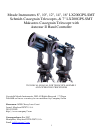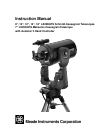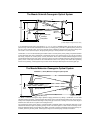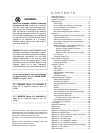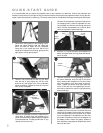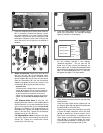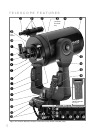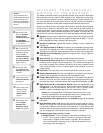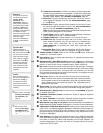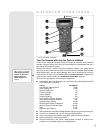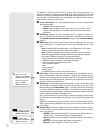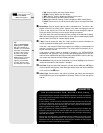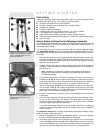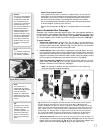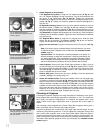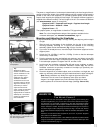
8
B. 12vDC Power Connector: Provides a connection so that the telescope
assembly may be powered from a standard 115v AC home outlet using
the optional #547 Power Adapter with Cable or the optional 12v DC #607
Cigarette Lighter Adapter. See
OPTIONAL ACCESSORIES, page 43.
C. Focus Port: Plug the microfocuser into this port. Control the microfo-
cuser through the Autostar II menus. See
HOT BUTTON MENUS, page
31, and
2$ below.
D. Reticle Port: Plug the optional reticle eyepiece into this port. Control
the reticle through the Autostar II menus. See
HOT BUTTON MENUS
page 31. Also see OPTIONAL ACCESSORIES, page 42.
Note: See the instruction sheets that are included with the focuser, the
reticle, and the autoguider for more details.
E. 12vDC Output: Use the 12vDC output to power telescope accessories
and the Maksutov fan on the 7"
LX200GPS model..
F. Handbox (HBX) Port: Plug the Autostar II coil cord into this port.
G. RS232 Ports (2): Provides connection with a PC and for current and
future Meade accessories. Your PC can control your
LX200GPS tele-
scope using serial commands. Go to the Meade website
(www.meade.com) to download the latest serial commands and
device pinouts.
H. Autoguider Port: Plug the optional autoguider into this port. See the
instruction sheet that came with your autoguider for more information.
1$ Tiltable Autostar II Holder: Attach to fork handles (see 1% below). Holds your
handbox in a convenient location.
1% Fork Handles: Use to lift optical tube assembly or to rotate the telescope when
attached to the tripod.
1^ Declination (Dec.) Slow-Motion Control: Make fine adjustments in Declination
(altitude) by turning this control with the Dec. Lock (see
1& below) in the locked
position. In order for this control to operate properly, power must be off.
1& Dec. Lock: Controls the manual vertical movement of the telescope. Turning the
Dec. lock counterclockwise unlocks the telescope enabling it to be freely rotated
by hand about the vertical axis. Turning the Dec. lock clockwise (to a firm feel
only) prevents the telescope from being moved manually, but engages the verti-
cal motor drive for Autostar II operation.
1* Dust Cover: Gently pry the dust cover from the front lens of the telescope.
Note: The dust cover should be replaced after each observing session
and the power turned off to the telescope. Verify that any dew that might
have collected during the observing session has evaporated prior to
replacing the dust cover.
1( Optical Tube: The main optical component that gathers the light from distant
objects and brings this light to a focus for examination through the eyepiece.
2) Declination (Dec.) Setting Circle (on left fork arm): See APPENDIX A, page 50,
for detailed information.
2! Viewfinder Collimation Screws: Use these six screws to adjust the alignment
of the viewfinder.
2@ 8 x 50mm Viewfinder: A low-power, wide-field sighting scope with crosshairs
that enables easy centering of objects in the telescope eyepiece.
2# GPS Receiver (see page 21 for photo): Receives information transmitted from
Global Positioning System satellites. See pages 18, 19, and 21 for more information.
2$ 4-Speed Zero Image-Shift Microfocuser: Allows precise image focus during
visual, CCD, and astrophotographic applications. Maintains precise image cen-
tering on even the smallest CCD chips. Operates at four speeds: Fine to fast
using the Arrow keys of the Autostar II hand controller. Plug microfocuser into the
Focus port (13C,Fig.1).
2% Tube Adapters: The optical and mechanical axes of the LX200GPS telescope
have been carefully aligned at the factory to ensure accurate object pointing. Do
not loosen or remove the optical tube assembly from the tube adapters. The
resulting misalignment of the axes will result in inaccurate slewing of the tele-
scope in the GO TO mode.
2! Want to learn more about
attaching and aligning
the viewfinder? See
page 15.
Definitions
Throughout this manual,
you will notice the terms
"Alt/Az," "Right
Ascension," and
"Declination." Alt/Az or
more properly, altazimuth,
is frequently used to refer
to altitude or Declination
(the up-and-down vertical
movement of the telescope)
and azimuth or Right
Ascension (the side-to-side
horizontal movement of the
telescope). Right
Ascension is abbreviated
as "R.A." and Declination
as "Dec."
2$ Want to learn more
about the Zero Image
Shift Microfocuser?
See pages 13, 14, and
31.
Caution:
When loosening the Dec.
lock, be sure to support the
optical tube (19, Fig. 1).
The weight of the tube
could cause the tube to
swing through the fork arms
suddenly.
Important Note:
After the telescope is
aligned (see page 18), the
Dec. slow motion control 1^
may be used and the tele-
scope will remain in align-
ment. However, if the R.A.
slow motion control 1) is
used after the telescope
has been aligned, align-
ment will be lost and the
telescope will need to be
realigned.



